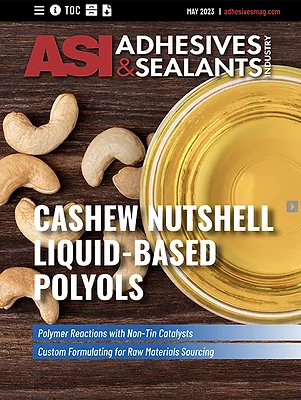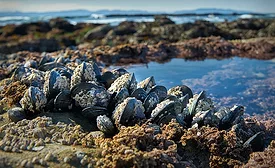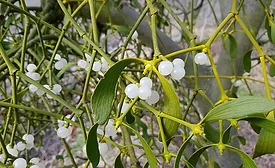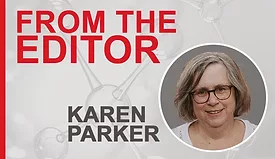Home » Publications » Adhesives & Sealants Industry
Adhesives & Sealants Industry

May 2023
Cover Story
Back to TopEvaluating the performance and key characteristics of CNSL-based polyols in the formulation of various PU systems, including protective coatings, adhesives, and foams.
Read More
Features
Back to TopSilane Terminated Polymer Reactions with Non-Tin Catalysts
Research demonstrates the performance of non-tin catalysts as a replacement for tin, satisfying regulatory concerns and performance requirements.
May 10, 2023
Mussels-Inspired Injectable Bioglue Seals Surgical Wounds
Researchers develop biodegradable hydrogel adhesive for sealing internal soft-tissue incisions using inspiration from nature.
May 15, 2023
Could Mistletoe Berries Help Produce a Biological Super Glue?
The abundant, biodegradable, and bio renewable mistletoe plant holds promising possibilities for adhesives.
May 4, 2023
Developing Resiliency and Targeting Growth Opportunities in the New Normal
Today’s business landscape offers opportunities for differentiation and growth for organizations that can build on the lessons they have learned over the past several years.
May 12, 2023
Columns
Back to TopAdhesive and Sealant Industry Gets Together in NOLA
One of the highlights of the event was the presentation of the ASC’s Innovation Awards, which honors the top three innovations from the industry.
May 26, 2023
The Unique Properties of Adhesives and Sealants in Electronics and Disassembly Functions
The adhesives industry will continue to develop products for the electronics industry that optimize durability and end-of-life solutions through options such as recycling and repair potential.
May 23, 2023
Achieving Flexibility in Adhesive Curing
A line lamp for curing adhesives and other multi-functional polymers offers flexibility while providing high-intensity curing.
May 17, 2023
Healthcare Supply Chains
As the healthcare industry supply chain faces more challenges, industries supporting healthcare must be proactive, resilient, and innovative to meet demand.
May 19, 2023
Keep the info flowing with our newsletters!
Get the latest industry updates tailored your way.
JOIN TODAY!Copyright ©2026. All Rights Reserved BNP Media.
Design, CMS, Hosting & Web Development :: ePublishing











